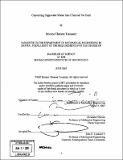Converting sugarcane waste into charcoal for Haiti
Author(s)
Toussaint, Etienne Clement
DownloadFull printable version (6.071Mb)
Other Contributors
Massachusetts Institute of Technology. Dept. of Mechanical Engineering.
Advisor
Alexander Slocum.
Terms of use
Metadata
Show full item recordAbstract
In Haiti, most families have traditionally relied on wood and wood-derived charcoal as their primary fuel source for indoor cooking. This resource has proven to be unsustainable, however, as over 90% of the Haitian countryside has already been deforested and wood is now in low supply. As a poor country, importing fuel is not a viable option and thus, the ability to utilize renewable energy sources is critical. The work of the Edgerton Development Lab, under the guidance of Amy Smith, has developed a process utilizing an oil drum kiln to convert readily available agricultural waste from sugarcane, known as bagasse, into clean burning charcoal briquettes. In order to improve the efficiency of the existing oil drum kiln, this research will explore the design of a brick kiln that is relevant for the social dynamic of developing countries, inexpensive to manufacture and simple to operate. By defining the best system applicable to the Haitian context, this research will enable the efficient production of charcoal. This research will also define the shape of the chamber and the steps involved in the conversion process, enabling Haitians to make use of their natural resources to address a critical energy need. In addition, the enhanced energy efficiency will reduce the production time of the charcoal briquettes. Lastly, this research will explore how this technology can be best integrated into the existing culture and lifestyle of the Haitian community and propose a strategy for community participation.
Description
Thesis (S.B.)--Massachusetts Institute of Technology, Dept. of Mechanical Engineering, 2007. Includes bibliographical references (leaves 46-47).
Date issued
2007Department
Massachusetts Institute of Technology. Department of Mechanical EngineeringPublisher
Massachusetts Institute of Technology
Keywords
Mechanical Engineering.